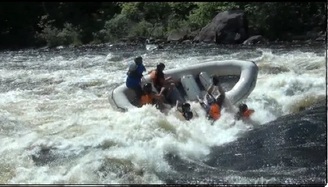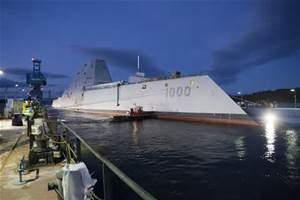My upfront apology for this cliché riddled page:
Live life to its fullest, at business and play. Without risk there can be no reward. You reached this point because you took a small risk; you were curious what would happen if you clicked on the raft. In this picture, I am shown toppling into the water. The risk I took was rafting on the Penobscot river, my initial reward was a mouthful of water. My long term memory is of fun, excitement, and camaraderie. Would you avoid the short term mouthful of water for the long term memory?
Business decisions are based on risk and reward analysis in order to maximize return on investment. How do you best reduce the risk and increase the return on investment? There is a doctrine that expounds on the importance of getting the details right early in the planning and development, and fixing problems that surface as soon as possible. This is exemplified in ship building by recognizing and correcting a design flaw as early as possible. Imagine that a bulkhead is placed in the way of piece of machinery that may one day break. The risk is the machine may fail the cost of fixing the problem in the design phase is reprinting schematic. Let it slide until the ship is at sea and you may have a war vessel dead in the water during a crisis.
Early in my career my inclination was to over think my due diligence. I wanted to avoid the dead in the water scenario. When asked to provide an estimate, I'd inquire and research and review and still only begrudgingly offer an inflated estimate. Along my career's evolution I met many impactful mentors and co-workers one of them told me this, "Sometimes you have to shoot without aiming." Which is a nicer way of saying, "Get off the pot or ..."
I now resolve these two conflicting principals by understand the dynamic nature of software development. The only constant is change. This is why I've embraced the Agile Methodology and became a scrum master. Besides the fact that being a 'scrum master' is a good ice breaker at a social gathering, Agile allows me follow the credo of another mentor who's voice still resonates today, "Do what you say and say what you do."
Be clear, concise, and open, while admitting gaffs in reasoning, and do so quickly so the ship can be righted. -- be transparent. One last recollection, I'm role playing at an Agile seminar. I'm an actor playing the role of someone who is transparent while another is hiding something. When questioned about a gaff the other actor is closed off, arms crossed, reluctant to explain the error. When it's my turn, I volunteer the information, apologetic and offer remedial actions. I have played the exercise out in real life and people do get past the problem and the problem quickly fades to a memory.
Live life to its fullest, at business and play. Without risk there can be no reward. You reached this point because you took a small risk; you were curious what would happen if you clicked on the raft. In this picture, I am shown toppling into the water. The risk I took was rafting on the Penobscot river, my initial reward was a mouthful of water. My long term memory is of fun, excitement, and camaraderie. Would you avoid the short term mouthful of water for the long term memory?
Business decisions are based on risk and reward analysis in order to maximize return on investment. How do you best reduce the risk and increase the return on investment? There is a doctrine that expounds on the importance of getting the details right early in the planning and development, and fixing problems that surface as soon as possible. This is exemplified in ship building by recognizing and correcting a design flaw as early as possible. Imagine that a bulkhead is placed in the way of piece of machinery that may one day break. The risk is the machine may fail the cost of fixing the problem in the design phase is reprinting schematic. Let it slide until the ship is at sea and you may have a war vessel dead in the water during a crisis.
Early in my career my inclination was to over think my due diligence. I wanted to avoid the dead in the water scenario. When asked to provide an estimate, I'd inquire and research and review and still only begrudgingly offer an inflated estimate. Along my career's evolution I met many impactful mentors and co-workers one of them told me this, "Sometimes you have to shoot without aiming." Which is a nicer way of saying, "Get off the pot or ..."
I now resolve these two conflicting principals by understand the dynamic nature of software development. The only constant is change. This is why I've embraced the Agile Methodology and became a scrum master. Besides the fact that being a 'scrum master' is a good ice breaker at a social gathering, Agile allows me follow the credo of another mentor who's voice still resonates today, "Do what you say and say what you do."
Be clear, concise, and open, while admitting gaffs in reasoning, and do so quickly so the ship can be righted. -- be transparent. One last recollection, I'm role playing at an Agile seminar. I'm an actor playing the role of someone who is transparent while another is hiding something. When questioned about a gaff the other actor is closed off, arms crossed, reluctant to explain the error. When it's my turn, I volunteer the information, apologetic and offer remedial actions. I have played the exercise out in real life and people do get past the problem and the problem quickly fades to a memory.


